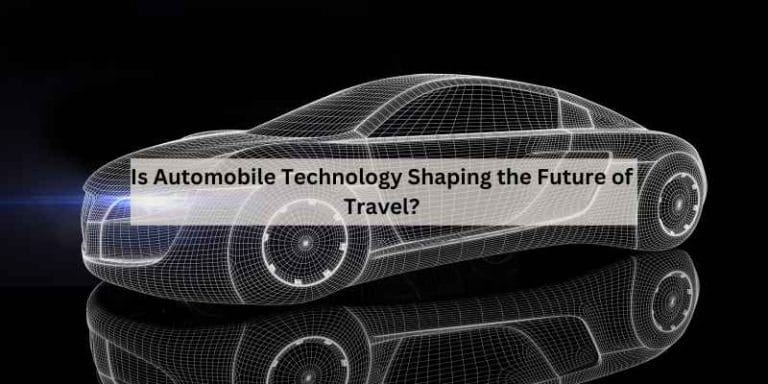What is the Purpose of Electric Car Technology: A Deep Dive
The purpose of electric car technology is to provide a sustainable and environmentally-friendly alternative to conventional internal combustion engine vehicles. Electric cars aim to reduce greenhouse gas emissions and dependence on fossil fuels by utilizing electric motors powered by rechargeable batteries.
These vehicles offer improved energy efficiency, lower operating costs, and reduced air pollution, contributing to a cleaner and greener transportation system. As advancements in electric vehicle technology continue to progress, innovations in battery design, energy management, autonomous driving, and wireless power transfer are being developed to enhance performance, range, and convenience.
With the growing demand for electric vehicles, manufacturers are investing in research and development to overcome challenges such as battery capacity, charging infrastructure, and cost-effectiveness, ultimately driving the widespread adoption of electric car technology.
Introduction To Electric Vehicles
The rise of electric cars has been driven by the need to reduce greenhouse gas emissions and replace conventional internal combustion engine vehicles. Key motivations for the development of electric car technology include improvements in energy management, battery design, autonomous driving, and wireless power transfer. These advancements offer a solution to environmental concerns and aim to enhance the performance and safety of electric vehicles. Additionally, challenges such as battery capacity, fast charging rate, battery lifetime, and cost-effectiveness are being addressed through innovative approaches. The global demand for electric cars continues to grow, prompting ongoing research and development in the field of electric vehicle technology.
Environmental Benefits
The widespread adoption of electric car technology plays a crucial role in reducing greenhouse gas emissions. By shifting from internal combustion engine vehicles to electric vehicles, the transportation sector can significantly contribute to mitigating climate change. Moreover, the use of electric cars has a positive impact on air quality, reducing harmful pollutants that affect public health and the environment.
Technological Innovations
Electric car technology has been advancing rapidly in recent years, with a focus on improving energy management, battery design and optimization, autonomous driving, and wireless power transfer. These advancements have made electric vehicles (EVs) more efficient and cost-effective, offering a solution to reduce greenhouse gas emissions and replace conventional internal combustion engine vehicles.
Battery technologies, battery management systems, charging methods, traction motors, and power conversion technologies are among the components and technologies employed in EVs. Modeling and design strategies, such as digital twins with connected Internet of Things (IoT), are being explored to enhance EVs’ performance and safety. Wireless power transfer (WPT) systems, specifically magnetic resonance WPT, are being developed to enable efficient charging and power transfer in EVs. However, challenges in EV technology include battery capacity, fast charging rate, battery lifetime, and cost-effectiveness, which are being addressed through innovative approaches.
Energy Efficiency And Management
Advancements in electric vehicle (EV) technology include improvements in energy management, battery design and optimization, autonomous driving, and wireless power transfer (WPT) systems. EVs offer a solution to reduce greenhouse gas emissions and replace conventional internal combustion engine vehicles. The components and technologies employed in EVs have been comprehensively reviewed, including battery technologies, battery management systems, charging methods, traction motors, and power conversion technologies. Modeling and design strategies, such as digital twins with connected Internet of Things (IoT), are being explored to enhance EVs’ performance and safety. Magnetic resonance WPT systems are being developed to enable efficient charging and power transfer in EVs. Challenges in EV technology include battery capacity, fast charging rate, battery lifetime, and cost-effectiveness, which are being addressed through innovative approaches.
Infrastructure And Charging
Electric car technology aims to revolutionize transportation by reducing greenhouse gas emissions and replacing traditional internal combustion engine vehicles. It involves advancements in energy management, battery design, wireless power transfer, and autonomous driving to enhance performance and safety. As the demand for electric vehicles increases, infrastructure and charging technology are evolving to meet the growing need for efficient and cost-effective solutions.
| Evolution of charging stations: | The development of electric car technology has led to the evolution of charging stations. In the early days, charging stations were limited to public locations and were slow to charge. However, with advancements in technology, charging stations have improved significantly, and now offer faster charging times and are available in a wider range of locations. In addition to public charging stations, home charging solutions have become increasingly popular, allowing electric car owners to charge their vehicles conveniently at home. |
Economic Implications
The purpose of electric car technology is to provide a sustainable and environmentally friendly alternative to traditional internal combustion engine vehicles. Electric cars aim to reduce greenhouse gas emissions and dependence on fossil fuels, while also offering improved energy efficiency and lower operating costs.
With advancements in battery design, energy management, and autonomous driving, electric cars are becoming increasingly popular and are seen as a key solution for the future of transportation.
| Economic Implications |
|---|
| Cost-effectiveness of EVs |
| Incentives and subsidies |
The purpose of electric car technology is to reduce greenhouse gas emissions and replace conventional internal combustion engine vehicles. Electric vehicles (EVs) offer a solution to this problem. However, challenges in EV technology include battery capacity, fast charging rate, battery lifetime, and cost-effectiveness. To address these challenges, innovative approaches such as battery management systems, charging methods, and power conversion technologies are being explored. Incentives and subsidies provided by governments and other organizations are also being used to make EVs more affordable. Despite these challenges, advancements in EV technology continue to improve energy management, battery design and optimization, autonomous driving, and wireless power transfer. As a result, the global demand for EVs is increasing, and more OEMs are migrating from ICE to BEV.
Consumer Adoption Barriers
The purpose of electric car technology is to reduce greenhouse gas emissions and replace conventional internal combustion engine vehicles. Advancements in energy management, battery design and optimization, autonomous driving, and wireless power transfer contribute to the solutions offered by electric vehicles (EVs). These vehicles have comprehensive components and technologies, including battery technologies, battery management systems, charging methods, traction motors, and power conversion technologies. Strategies such as digital twins with connected Internet of Things (IoT) are explored to enhance EVs’ performance and safety. Wireless power transfer (WPT) systems, specifically magnetic resonance WPT, are developed to enable efficient charging and power transfer in EVs. Challenges in EV technology include battery capacity, fast charging rate, battery lifetime, and cost-effectiveness, which are being addressed through innovative approaches.
Future Of Mobility
What is the Purpose of the Electric Car TechnologyPredictions For Ev ExpansionAdvancements in electric vehicle (EV) technology include improvements in energy management, battery design and optimization, autonomous driving, and wireless power transfer. EVs offer a solution to reduce greenhouse gas emissions and replace conventional internal combustion engine vehicles. The components and technologies employed in EVs have been comprehensively reviewed, including battery technologies, battery management systems, charging methods, traction motors, and power conversion technologies. Modeling and design strategies, such as digital twins with connected Internet of Things (IoT), are being explored to enhance EVs’ performance and safety. Wireless power transfer (WPT) systems, specifically magnetic resonance WPT, are being developed to enable efficient charging and power transfer in EVs. Challenges in EV technology include battery capacity, fast charging rate, battery lifetime, and cost-effectiveness, which are being addressed through innovative approaches. |
Material Innovations In Ev Design
Electric car technology serves multiple purposes, with a primary focus on reducing environmental impact. The use of lightweight materials for body construction enables greater energy efficiency and extended driving range. Additionally, durability and safety considerations are paramount, necessitating the adoption of robust materials that protect occupants while minimizing overall vehicle weight. These material innovations are critical in advancing the design and performance of electric vehicles, supporting the widespread adoption of sustainable transportation solutions.
Frequently Asked Questions
What Is The Main Purpose Of Electric Cars?
The main purpose of electric cars is to reduce greenhouse gas emissions and replace conventional internal combustion engine vehicles. Electric cars offer a solution to decrease pollution and reliance on fossil fuels. By utilizing electric motors and batteries, they provide a more sustainable and environmentally friendly mode of transportation.
Additionally, electric cars contribute to the advancement of technology and innovation in the automotive industry.
Why Is Ev Technology Important?
EV technology is important because it helps reduce greenhouse gas emissions and replace traditional vehicles. Advancements in energy management, battery design, and autonomous driving contribute to the growth of EVs. These vehicles offer a solution to environmental concerns and are continuously being improved for better performance, safety, and cost-effectiveness.
By transitioning to EVs, we can contribute to a greener and more sustainable future.
What Is The Purpose Of The Electrical System In A Car?
The purpose of the electrical system in a car is to provide power to various components and systems. It allows for the operation of essential features such as the lights, wipers, radio, and air conditioning. Additionally, the electrical system is responsible for starting the engine and charging the battery.
It plays a crucial role in ensuring the overall functionality and convenience of the vehicle.
What Is The Technology Of Electric Vehicle?
The technology of electric vehicles (EVs) includes advancements in energy management, battery design, autonomous driving, and wireless power transfer. EVs reduce emissions and replace traditional combustion engine vehicles. Components like batteries, charging methods, and power conversion technologies are being improved.
Digital twins and IoT are used for performance enhancement. Challenges include battery capacity, fast charging, lifetime, and cost-effectiveness, which are being addressed through innovative approaches. EVs typically have a single-speed transmission due to the simplicity of the drivetrain.
Conclusion
Electric car technology serves a crucial purpose in addressing environmental concerns and providing a sustainable transportation solution. Through advancements in energy management, battery design, and autonomous driving, electric vehicles offer a way to reduce greenhouse gas emissions and replace conventional internal combustion engine vehicles.
The ongoing development of components and technologies, such as battery management systems and power conversion technologies, aims to enhance performance and safety. Challenges, such as battery capacity and cost-effectiveness, are being addressed through innovative approaches. As the demand for electric vehicles increases, we can anticipate further improvements in infrastructure and charging options, leading to wider adoption and a greener future.







